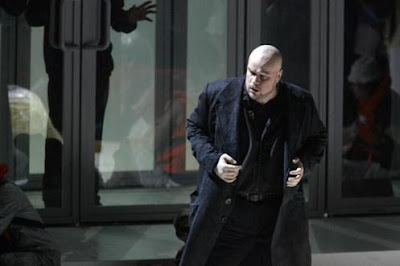The series sails forth with Wagner's high seas ghost story.
by Paul J. Pelkonen
This is the first outing, the maiden voyage if you will of a new feature on Superconductor focusing on classic (and some modern) recordings of the great "canon" operas. We're going to start with a series on the ten major operas of Wagner and whether it will continue beyond that will depend on how many of you all click and read. Sounds good? OK. Let's go.)
Der Fliegende Holländer is Richard Wagner's fourth opera, but the earliest of his works to be considered "canon" by the Bayreuth Festival, the German opera festival that was founded by the composer himself in an opera house of his own design in the tiny Franconian spa town of Bayreuth. Holländer (referred to hereafter by its English title The Flying Dutchman) was written in 1842 as the struggling Wagners lived in Paris and Richard tried (and failed) to get Rienzi staged at the Paris Opera.
by Paul J. Pelkonen
 |
| The legendary ghost ship The Flying Dutchman inspired Wagner's 1843 opera. Digital image is © UbiSoft. |
Der Fliegende Holländer is Richard Wagner's fourth opera, but the earliest of his works to be considered "canon" by the Bayreuth Festival, the German opera festival that was founded by the composer himself in an opera house of his own design in the tiny Franconian spa town of Bayreuth. Holländer (referred to hereafter by its English title The Flying Dutchman) was written in 1842 as the struggling Wagners lived in Paris and Richard tried (and failed) to get Rienzi staged at the Paris Opera.








